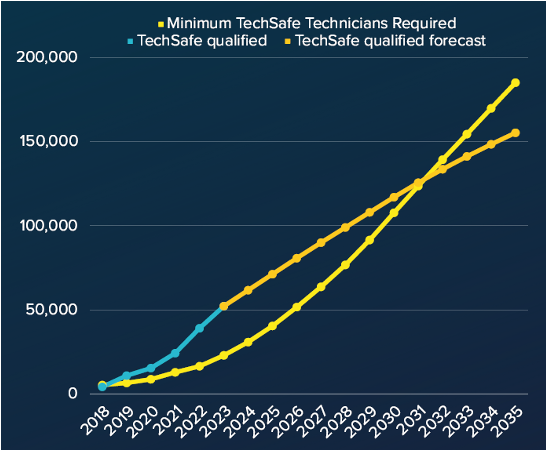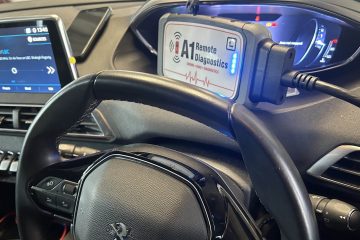The point at which a skills crisis will impact the electric vehicle market has been pushed back, as more technicians get involved with EV repair training.
New data from the Institute of the Motor Industry (IMI) shows that at the end of January 2023, there were 52,000 qualified EV repair technicians in the UK, representing 22% of all those working on vehicles in the country. This figure was up from 45,300 just six months earlier.
This means that previous projections of a shortfall in the EV repair market by 2029, with a gap of 13,000 qualified technicians by 2032, has been revised. The IMI’s latest EV TechSafe data shows the skills gap will only materialise in 2032 itself, with a shortage of 5,670 technicians.
Growing EV repair market
“It is encouraging to see the steady growth in EV qualified workforce, especially as the market need is now expected to be met for a least another five years,” commented Emma Carrigy, Research Manager at the IMI.
“Of course, attracting new talent and training technicians to work safely on electrified vehicles does take time, so the industry must not be complacent or take its foot off the recruitment or training pedals. After all, a skills gap is still forecast and could have a significant impact on drivers’ ability to maintain and repair their electric and hybrid vehicles safely.”
Forecast gap between predicted number of technicians required to service and maintain Electric Vehicles and TechSafe EV Technicians

The number of electrified vehicles, including hybrids, plug-in hybrids (PHEVs) and battery-electric vehicles (BEVs) is on the rise in the UK. January saw the one millionth BEV take to UK roads, and with aggressive price reductions and promotions expected in 2024, as carmakers look to meet the 22% sales target set out by the Zero-Emission Vehicle (ZEV) Mandate, a more rapid growth projection is expected.
The all-electric technology is the second most-popular powertrain type in the country, after petrol, while they, together with hybrids and PHEVs, make up over a quarter of passenger-car registrations each month.
More to come
With a ban on the sale of new petrol and diesel cars coming in 2035, carmakers are expected to wind down their internal-combustion engine offerings in the coming years. At the recent Geneva International Motor Show, every new car on display featured an electrified powertrain, highlighting the focus for the future.
The IMI predicts that by 2030 the sector will need more than 107,000 EV repair technicians, increasing to 139,000 by 2032, and 185,000 by 2035. If current training trends continue, it is expected that there will be a shortfall of 30,000 EV repair qualified technicians by the time the ban of new ICE vehicle sales comes into force in 2035.
“As the EV parc increases, and ages, drivers and fleet managers need to have the confidence that their chosen garage is able to service, repair and maintain their electric and hybrid vehicles”, added Carrigy. “To help meet that need, the IMI’s ‘There’s More to Motor’ campaign is continuing to change perceptions of the industry and the career options it provides.”




You must be logged in to post a comment.